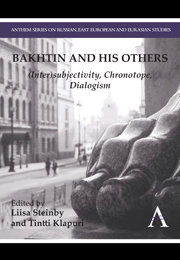Book contents
- Frontmatter
- Contents
- Acknowledgments
- Translation and Transliteration
- Introduction: The Acting Subject of Bakhtin
- Chapter 1 Bakhtin and Lukács: Subjectivity, Signifying Form and Temporality in the Novel
- Chapter 2 Bakhtin, Watt and the Early Eighteenth-Century Novel
- Chapter 3 Concepts of Novelistic Polyphony: Person-Related and Compositional-Thematic
- Chapter 4 Familiar Otherness: Peculiarities of Dialogue in Ezra Pound's Poetics of Inclusion
- Chapter 5 Author and Other in Dialogue: Bakhtinian Polyphony in the Poetry of Peter Reading
- Chapter 6 Tradition and Genre: Thomas Kyd's The Spanish Tragedy
- Chapter 7 Bakhtin's Concept of the Chronotope: The Viewpoint of an Acting Subject
- Chapter 8 The Provincial Chronotope and Modernity in Chekhov's Short Fiction
- List of Contributors
Chapter 8 - The Provincial Chronotope and Modernity in Chekhov's Short Fiction
Published online by Cambridge University Press: 05 May 2013
- Frontmatter
- Contents
- Acknowledgments
- Translation and Transliteration
- Introduction: The Acting Subject of Bakhtin
- Chapter 1 Bakhtin and Lukács: Subjectivity, Signifying Form and Temporality in the Novel
- Chapter 2 Bakhtin, Watt and the Early Eighteenth-Century Novel
- Chapter 3 Concepts of Novelistic Polyphony: Person-Related and Compositional-Thematic
- Chapter 4 Familiar Otherness: Peculiarities of Dialogue in Ezra Pound's Poetics of Inclusion
- Chapter 5 Author and Other in Dialogue: Bakhtinian Polyphony in the Poetry of Peter Reading
- Chapter 6 Tradition and Genre: Thomas Kyd's The Spanish Tragedy
- Chapter 7 Bakhtin's Concept of the Chronotope: The Viewpoint of an Acting Subject
- Chapter 8 The Provincial Chronotope and Modernity in Chekhov's Short Fiction
- List of Contributors
Summary
The concept of the chronotope, which Bakhtin launches in the essay ‘Forms of Time and Chronotope in the Novel’ (‘Formy vremeni i khronotopa v romane’), pertains to historically developing spatio-temporal forms in the novel. Bakhtin describes the chronotope as expressing the inseparability of space and time (time being the fourth dimension of space):
In the literary artistic chronotope, spatial and temporal indicators are fused into one carefully thought-out, concrete whole. Time, as it were, thickens, takes on flesh, becomes artistically visible; likewise, space becomes charged and responsive to the movements of time, plot and history.
(Bakhtin 2008, 84)In what follows, I explore and develop further the concept of the chronotope of the provincial town, which Bakhtin mentions in passing in the concluding remarks to his lengthy essay. Here Bakhtin takes up three of the most important spatio-temporal forms and their main representatives in nineteenth-century realistic literature: the chronotope of the provincial town (Flaubert), that of the threshold (Dostoevsky), and that of biographical time (Tolstoy) (Bakhtin 2008, 247–50). The provincial chronotope is characterized by themes of repetition and unchangeability; according to Bakhtin, provincial towns are the realms of cyclical everyday time, since ‘[h]ere there are no events, only “beings” that constantly repeat themselves’ (Bakhtin 2012, 493).
- Type
- Chapter
- Information
- Bakhtin and his Others(Inter)subjectivity, Chronotope, Dialogism, pp. 127 - 146Publisher: Anthem PressPrint publication year: 2013



